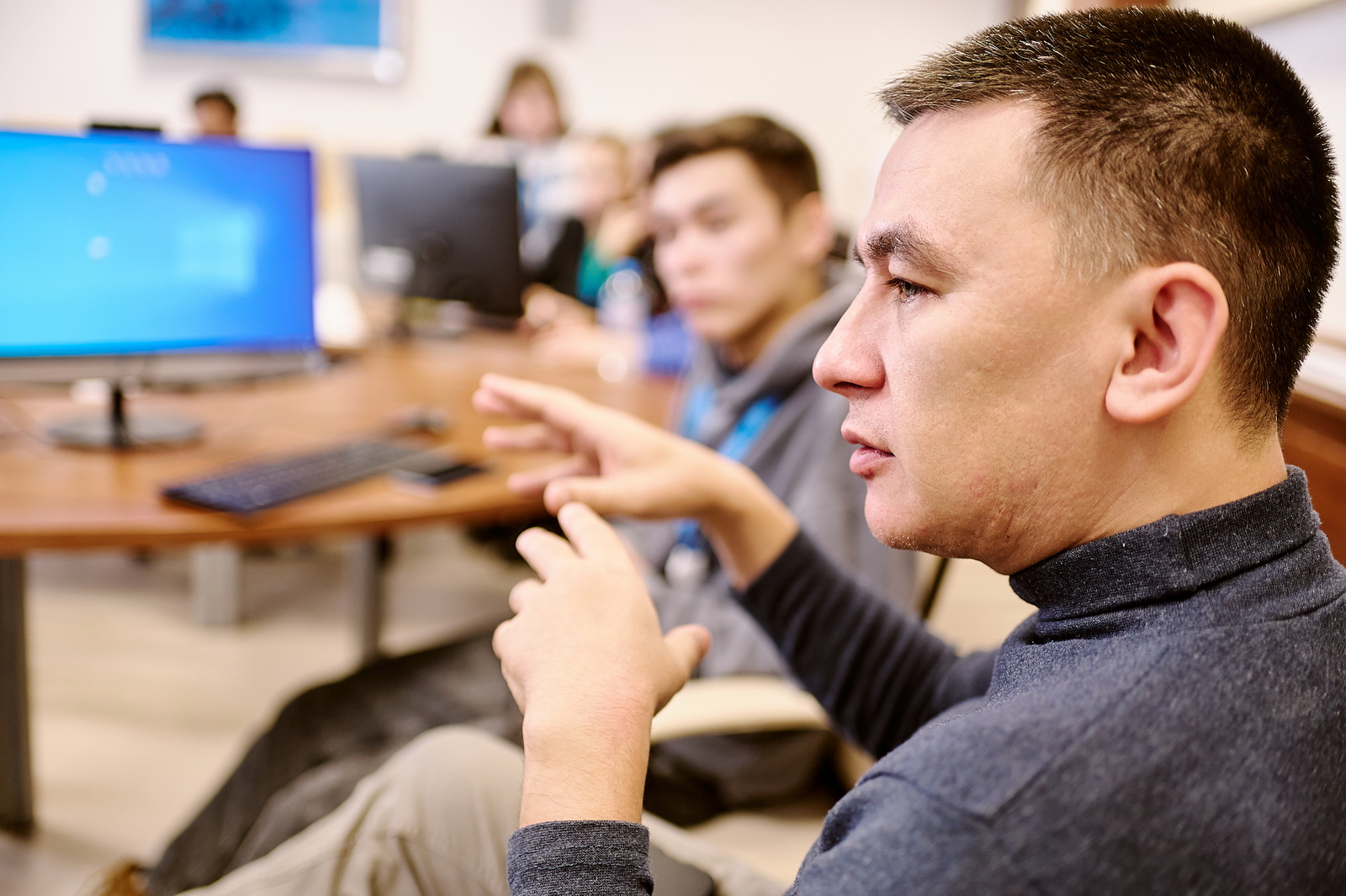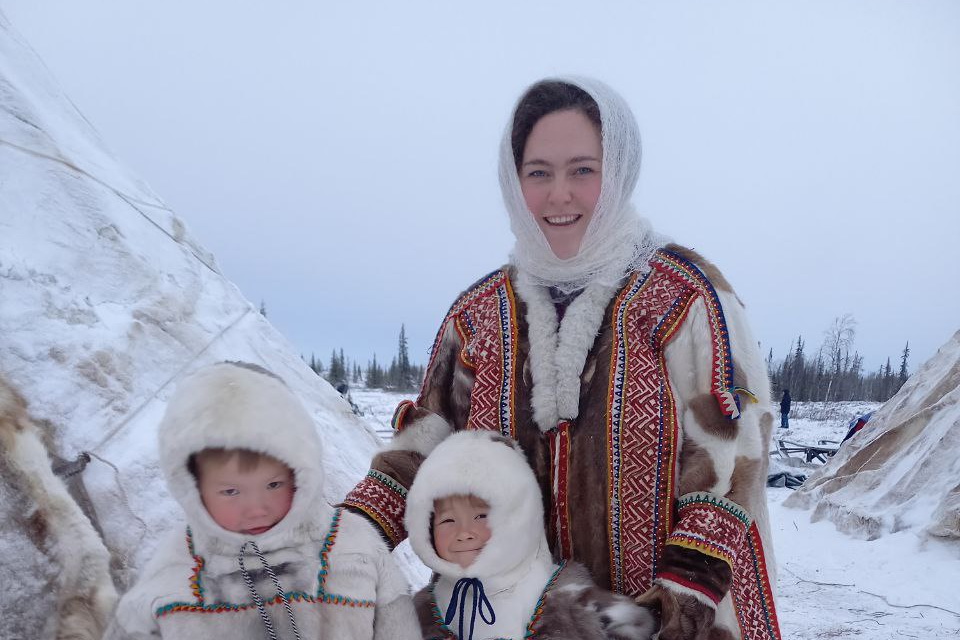Associate professor of the Department of English Language for the Faculties with Natural-Science and Physical-Mathematical Focus of the Faculty of Foreign Languages, Denis Tokmashev, staff scientist at the Laboratory of Linguistic Anthropology, and Aleksandra Romakhova, a student of the Faculty of History and Political Sciences, took part in a Salekhard-based forum, Russian North. Additionally, Denis Tokmashev was a moderator for the section Preservation and Promotion of the Linguistic Heritage of the Indigenous Minorities of the North, Siberia, and Russian Far East; Aleksandra Romakhova was distinguished as a student who shows active interest in the development and preservation of the traditions of the indigenous peoples.
The forum was part of the main events of Russia's being chair of the Arctic Council from 2021 to 2023. The forum brought together 100 people from 23 regions: students, early-career scientists, social activists, politicians, entrepreneurs, ethnobloggers, language activists—all involved in socially significant issues of the Siberian, northern, and Far Eastern areas of the Russian Federation. Chosen as the venue for the forum was the art residence Polaris, set up on the initiative of the governor of Yamalo-Nenets Autonomous Okrug, Dmitriy Artyukhov, as part of the federal program for promoting creative industries throughout the country.
Denis Tokmashev led the work of the section Preservation and Promotion of the Linguistic Heritage of the Indigenous Minorities of the North, Siberia, and the Russian Far East. Following the results of four days, the participants presented for defense the educational program of the ethnic camp Children of Nomads; a set of means to promote native languages through favorite activities and hobbies (marathon racing, handicraft, literary creativity); a trilingual phrasebook Friendship Booklet voiced in the Nenets, Khanty, and Selkup languages; and a series of analytical video interview surveys for media projects And the Spirit of my Ancestors Will Rise in Me (in Russian) and Native Voices (in the national languages).
“Our team recorded a video interview, where representatives of the Nenets, Tyva, Altai, and Khanty peoples spoke in their mother tongues about the importance of preserving national cultures of the Russian minorities. We had a tight schedule, but everyone was passionate about the project. I liked that many participants are trying something new in the forum: I myself have tried directing a video and doing an interview for the first time in my life,” said Aleksandra Romakhova.
The second moderator of this section was Olga Gorskikh, associate professor of Tomsk State University of Control Systems and Radioelectronics, who worked in the University of Tomsk on the preservation and promotion of the Russian minorities’ native languages and ethnic and cultural education. As an activist and expert in linguistics, Denis Tokmashev additionally took part in the recording of the independent project Parallel 67 on the radiowave Radio of Russia. Yamal, where he talked about the fate of the languages of the indigenous peoples of Russia.

“This was my first visit to Salekhard and my first responsible role in a federal-scale event,” noted Denis Tokmashev. “According to what colleagues say, our section drew the most attention from the participants of Russian North: some of them already knew their native language, some only planned to study it. My case was creating a trilingual booklet–phrasebook in Nenets, Khanty and North Selkup languages voiced by native speakers, whose recordings were presented in the form of QR codes. The booklet will acquaint the indigenous youngsters with the neighboring speaking etiquettes. Apart from that, I got to visit an actual reindeer camp owned by the Northern Khanty people, for me that was one of the most memorable experiences.”
All projects in the forum Russian North 2022 earned high praise from the honored guests of the event. At the closing ceremony of the forum, the organizers announced the winners of the grant competition Rosmolodezh aimed at supporting indigenous minorities. Among the winning projects, each winning up to 300 thousand rubles, are a system of online supplementary education system for children undergoing long-term treatment in an infectious disease hospital's tuberculosis department; apps and software in the Nivkh language (Amur dialect); and a club of scientific and technical creativity.
“At the forum, we, the participants, had enough time to make friends with each other. We continue chatting in social media, we even agreed to exchange postcards. It is amazing that everyone at the forum is sincerely ambitious and passionate about the future of their native land and is trying to do something to bring prosperity to it,” Aleksandra Romakhova shared her impressions. “The forum gave us the tools and knowledge that we can use in future projects. Some of the participants will continue to apply for grants with projects created at Russian North. In general, we have everything to put our ideas into practice, because the government is interested in preserving the culture and identity of indigenous peoples. Our uniqueness and strength lie in Russia's diversity.”

The forum program included panel discussions between experts and honored guests, hands-on tutorials, workshops, and platforms for experience exchange. Divided into groups, the forum participants discussed challenges of entrepreneurship at a young age, preservation and promotion of linguistic heritage, development of ethnotourism, and leadership skills. As part of the cultural immersion program, the participants visited traditional residence sites of indigenous minorities, which included, for example, a reindeer herders' camp, and studied the customs and traditions of the Northern minorities, as well as literature in the national languages. A multisport competition and a quiz were also open for participation.
For reference: The Roscongress Foundation is the event operator of Russia's chairmanship in the Arctic Council. The organizers of the forum Russian North 2022 were Rosmolodezh and the government of the Yamal-Nenets Autonomous Okrug.
